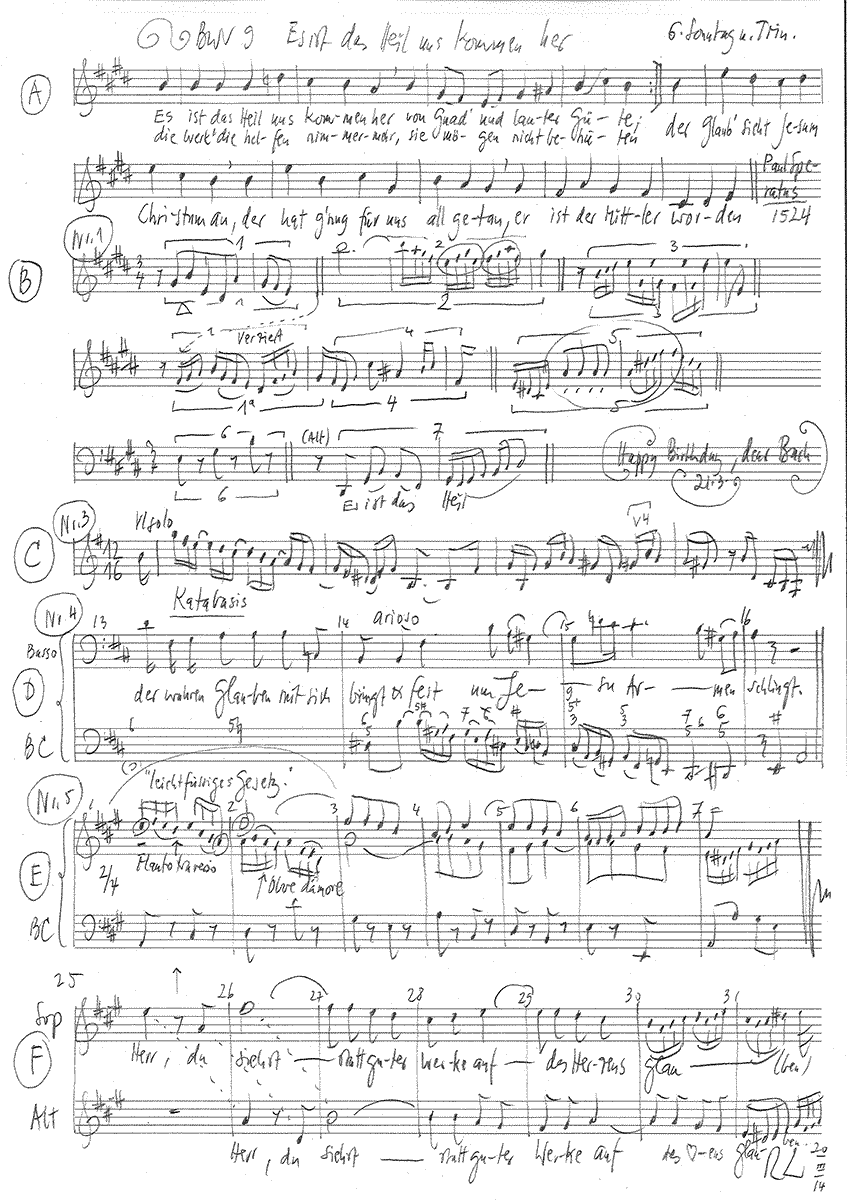
Es ist das Heil uns kommen her
BWV 009 // For the Sixth Sunday after Trinity
(Now is to us Salvation come) for soprano, alto, tenor and bass, vocal ensemble, transverse flute, oboe d’ amore, bassoon, strings and basso continuo
Composed for the Sixth Sunday after Trinity in 1724, cantata BWV 9 “Es ist das Heil uns kommen her” (Now is to us salvation come) proffers a charming display of the unique inventiveness in Bach’s chorale cantata cycle.

Place of composition in the church year
Pericopes for Sunday
Pericopes are the biblical readings for each Sunday and feast day of the liturgical year, for which J. S. Bach composed cantatas. More information on pericopes. Further information on lectionaries.
Siehe, wie fein und lieblich ist’s, dass Brüder einträchtig beieinander wohnen! Wie der köstliche Balsam ist, der vom Haupt Aarons herabfliesst in seinen ganzen Bart, der herabfliesst in sein Kleid, wie der Tau, der vom Hermon herabfällt auf die Berge Zions. Denn daselbst verheisst der Herr Segen und Leben immer und ewiglich.
Wisset ihr nicht, dass alle, die wir in Jesum Christum getauft sind, in seinen Tod getauft sind? So sind wir ja mit ihm begraben durch die Taufe in den Tod, auf dass, gleichwie Christus ist auferweckt von den Toten durch die Herrlichkeit des Vaters, also auch wir in einem neuen Leben wandeln sollen. So wir aber samt ihm gepflanzt werden zu gleichem Tode, so werden wir auch seiner Auferstehung gleich sein, dieweil wir wissen, dass unser alter Mensch samt ihm gekreuzigt ist, auf dass der sündliche Leib aufhöre, dass wir hinfort der Sünde nicht dienen. Denn wer gestorben ist, der ist gerechtfertigt von der Sünde. Sind wir aber mit Christo gestorben, so glauben wir, dass wir auch mit ihm leben werden, und wissen, dass Christus, von den Toten auferweckt, hinfort nicht stirbt; der Tod wird hinfort über ihn nicht herrschen.
Denn ich sage euch: Es sei denn eure Gerechtigkeit besser als der Schriftgelehrten und Pharisäer, so werdet ihr nicht in das Himmelreich kommen. Ihr habt gehört, dass zu den Alten gesagt ist: «Du sollst nicht töten; wer aber tötet, der soll des Gerichts schuldig sein.» Ich aber sage euch: Wer mit seinem Bruder zürnet, der ist des Gerichts schuldig; wer aber zu seinem Bruder sagt: «Racha!»*, der ist des Rats schuldig; wer aber sagt: «Du Narr!», der ist des höllischen Feuers schuldig. Darum, wenn du deine Gabe auf dem Altar opferst und wirst allda eingedenk, dass dein Bruder etwas wider dich habe, so lass allda vor dem Altar deine Gabe und gehe zuvor hin und versöhne dich mit deinem Bruder, und alsdann komm und opfere deine Gabe. Sei willfährig deinem Widersacher bald, dieweil du noch bei ihm auf dem Wege bist, auf dass dich der Widersacher nicht dermaleinst überantworte dem Richter, und der Richter überantworte dich dem Diener, und werdest in den Kerker geworfen. Ich sage dir wahrlich: Du wirst nicht von dannen herauskommen, bis du auch den letzten Heller bezahlest.
Would you like to enjoy our videos ad-free? Subscribe to YouTube Premium now...
Workshop
Reflective lecture
Publikationen zum Werk im Shop
Choir
Soprano
Mirjam Berli, Olivia Fündeling, Guro Hjemli, Susanne Seitter, Noëmi Sohn Nad
Alto
Jan Börner, Antonia Frey, Alexandra Rawohl, Damaris Rickhaus, Lea Scherer
Tenor
Daniel Issa, Achim Glatz, Sören Richter, Nicolas Savoy
Bass
Fabrice Hayoz, Philippe Rayot, Daniel Pérez, William Wood
Orchestra
Conductor
Rudolf Lutz
Violin
Amandine Beyer (special Guest), Plamena Nikitassova
Viola
Martina Bischof
Violoncello
Maya Amrein
Violone
Iris Finkbeiner
Oboe d’amore
Kerstin Kramp
Bassoon
Susann Landert
Transverse flute
Marc Hantaï
Organ
Nicola Cumer
Musical director & conductor
Rudolf Lutz
Workshop
Participants
Karl Graf, Rudolf Lutz
Reflective lecture
Speaker
Amandine Beyer
Recording & editing
Recording date
03/21/2014
Recording location
Trogen
Sound engineer
Stefan Ritzenthaler
Director
Meinrad Keel
Production manager
Johannes Widmer
Production
GALLUS MEDIA AG, Switzerland
Producer
J.S. Bach Foundation of St. Gallen, Switzerland
Librettist
Text No. 1, 7
Paul Speratus, 1523
Text No. 2–6
Poet unknown
First performance
Sixth Sunday after Trinity,
20 July 1732 (?)
In-depth analysis
In a delicate and enchanting setting for transverse flute and oboe d’amore, the introductory chorus reveals the paradigmatic shift of Martin Luther’s doctrine with great musical grace: ultimately, it is not through “works”, achievements and deeds, but only “by grace and purest favour” that mercy and vindication can enter this world and the soothed conscience. Here, the vibrant triple metre and radiant E major key musically underscore the certitude and serenity felt by those who have thrown off the shackles of the external world and become one with God.
The following bass recitative, by contrast, draws a pessimistic study of humankind that reaches a devastatingly realistic conclusion: human weakness is the ultimate undoing of every covenant founded on law and discipline. In this sensitive rendering of the Lutheran tenet of justification by faith, both composer and librettist effectively express why humankind needs a path to salvation that is free of all calculated action.
The tenor aria presents a highly subjective commentary on the priestly certitude of the pronouncement in the bass recitative. In a tone of distress, the soloist trembles at the depths of damnation that the sinful human – the protagonist of this dramatic self-accusation – can barely escape. Set in the E minor tonality of the St Matthew Passion, the singer, driven to sheer desperation by the impossible demand, is mercilessly harried forward by the violin in a skittering gigue.
The sermon from the second movement is then resumed in a bass recitative that recalls Christ’s act of love in fulfilling God’s law on behalf of all humankind. The new beginning enabled by this ultimate sacrifice is expressed here as a fervent embrace in Jesus’ arms, and all sighs of sorrow are taken up and resolved by the bass in an arioso conclusion.
Structured as a quintet for voices, winds and continuo, the aria “Lord, thou look’st past our good labours, to the heart’s believing power,” responds to the bass recitative with a light and artistic setting that demonstrates how strict law, musically expressed as a double canon, can be rendered compassionate by the invigorating breath of love. If there is one composition that perfectly unites Bach’s ideal of an artistic realisation of divine harmony with the Lutheran doctrine of justification by faith, then it is this duet, both mellifluous and profound, which reveals the unparalleled force of combining the intimate conversation of the heart with the making of music. The pared down scoring in the middle section serves to highlight the movement’s essential message: the Highest has eyes only for “faith”; adornment and finery are dispensable.
The third bass recitative then renews its inquiry in a tone of spiritual counsel, identifying the Gospel as an enduring source of faith, ere the closing chorale issues a call for resilience and strength in the face of all abandonment and uncertainty. That tradition and the letter must be presented here to counter the “No” of the heart illustrates humanity’s great struggle in bowing to a higher power – indeed, the fact that God is at work precisely where and when his grace is most sorely missed constitutes an ethical paradox that was already more difficult for Bach’s contemporaries to resolve than any musical sophism.
Libretto
1. Chor
Es ist das Heil uns kommen her
von Gnad und lauter Güte;
die Werk’ die helfen nimmermehr,
sie mögen nicht behüten;
der Glaub’ sieht Jesum Christum an,
der hat g’nug für uns all getan,
er ist der Mittler worden.
2. Rezitativ (Bass)
Gott gab uns ein Gesetz, doch waren wir
zu schwach,
dass wir es hätten halten können.
Wir gingen nur den Sünden nach,
kein Mensch war fromm zu nennen;
der Geist blieb an dem Fleische kleben
und wagte nicht zu widerstreben.
Wir sollten im Gesetze gehn
und dort als wie in einem Spiegel sehn,
wie unsere Natur unartig sei:
Und dennoch blieben wir dabei.
Aus eigner Kraft war niemand fähig,
der Sünden Unart zu verlassen,
er mocht auch alle Kraft zusammenfassen
.
3. Arie (Tenor)
Wir waren schon zu tief gesunken,
der Abgrund schluckt uns völlig ein,
die Tiefe drohte schon den Tod,
und dennoch konnt in solcher Not
uns keine Hand behülflich sein.
4. Rezitativ (Bass)
Doch musste das Gesetz erfüllet werden;
deswegen kam das Heil der Erden,
des Höchsten Sohn, der hat es selbst erfüllt
und seines Vaters Zorn gestillt.
Durch sein unschuldig Sterben
liess er uns Hülf’ erwerben;
wer nun demselben traut,
wer auf sein Leiden baut,
der gehet nicht verloren.
Der Himmel ist vor den erkoren,
der wahren Glauben mit sich bringt
und fest um Jesu Armen schlingt.
5. Arie (Duett Sopran, Alt)
Herr, du siehst statt guter Werke
auf des Herzens Glaubensstärke,
nur den Glauben nimmst du an.
Nur der Glaube macht gerecht,
alles andre scheint zu schlecht,
als dass es uns helfen kann.
6. Rezitativ (Bass)
Wenn wir die Sünd’ aus dem Gesetz erkennen,
so schlägt es das Gewissen nieder;
doch ist das unser Trost zu nennen,
dass wir im Evangelio
gleich wieder froh
und freudig werden:
dies stärket unsern Glauben wieder.
Drauf hoffen wir der Zeit,
die Gottes Gütigkeit
uns zugesaget hat,
doch aber auch aus weisem Rat
die Stunde uns verschwiegen.
Jedoch, wir lassen uns begnügen;
er weiss es, wenn es nötig ist,
und brauchet keine List an uns:
Wir dürfen auf ihn bauen
und ihm allein vertrauen.
7. Choral
Ob sich’s anliess, als wollt’ er nicht,
lass dich es nicht erschrecken,
denn wo er ist am besten mit,
da will er’s nicht entdecken;
sein Wort lass dir gewisser sein,
und ob dein Herz spräch lauter Nein,
so lass doch dir nicht grauen.






